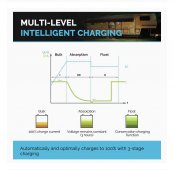When driving between camping spots I already have an alternator turning and charging the engine battery.
I know not to connect my alternator to the coach deep cycle batteries since this would probably overcharge the engine battery.
Thinking about a DC to DC battery charger, I had the thought that the MPPT is essentially just a DC to DC charger isn’t it?
Can I safely wire the alternator to the PV input of the MPPT? I expect I would have to unplug the solar array for this to work.
I've done that, sort of. I haven't built my system yet, but, while testing, I've reached the point where I have an undersized (20AH of Tesla NCA cells) 24V "house" battery, a slightly larger (38AH LiFePO4) backup 12V battery, and of course a Group 65 starter battery in the vehicle, connected to the alternator. My test is making a pot of tea with an electric kettle every morning, and it turned out that I can't do that from the 20AH test battery, especially after it's become somewhat depleted overnight, before the sun comes up. So, when I want tea before the Sun comes up, I start recharging the 24V from the 12V, using a cheap Chinese boost converter, with variable voltage and current, set to about 30V, or a couple of amps (depending) paralleled with the solar panels (I have a fistful of Schottky diodes, and added one to the output of the boost converter, just in case, although I think it's not necessary). But now the 12V will need recharging, so, after the Sun comes up, I recharge it from the 24V, using a buck converter (carefully adjusted to 14.4V, and current limited), to the charge connection on the BMS. But, what if there is no Sun? Well, I already had a situation with my starter battery, which used to be trickle-charged by a small panel on the dashboard, but, now that I'm setting larger panels on top of the vehicle, including over the windshield, for tests, isn't enough, so I looked at the voltages, thought about it, and tried running a cable from the buck converter to the starter battery (I already knew that the vehicle voltage regulator stops at 14.4V), which worked OK, and one day, when the backup 12V charge connection and the starter 12V battery voltages were not too dissimilar, I just tied them together. It seems OK, for testing at least. Once I have those connections, if I start the vehicle, and disconnect the output of the house battery 24V to 12V buck converter, I'm charging on alternator. I think. And when I connect the boost converter's 12V input, charging the house battery, via the solar input of the controller.
It's unconventional, I suppose, and I can think of some ways it could go horribly wrong, and there are almost certainly more ways I haven't thought of, but, I might wind up with some variation of this setup in my final design, probably with more breakers, and fuses, and a low voltage disconnect which I have in my box of stuff, to be installed. In case it helps the reader to know, I started tinkering with electronics about 55 years ago, and, I started tinkering with solar in my van a little over a year ago, which is to say I don't try to go too fast, and think about what I am doing, when I am departing from convention, which takes a lot longer, one way or the other, in my experience.




